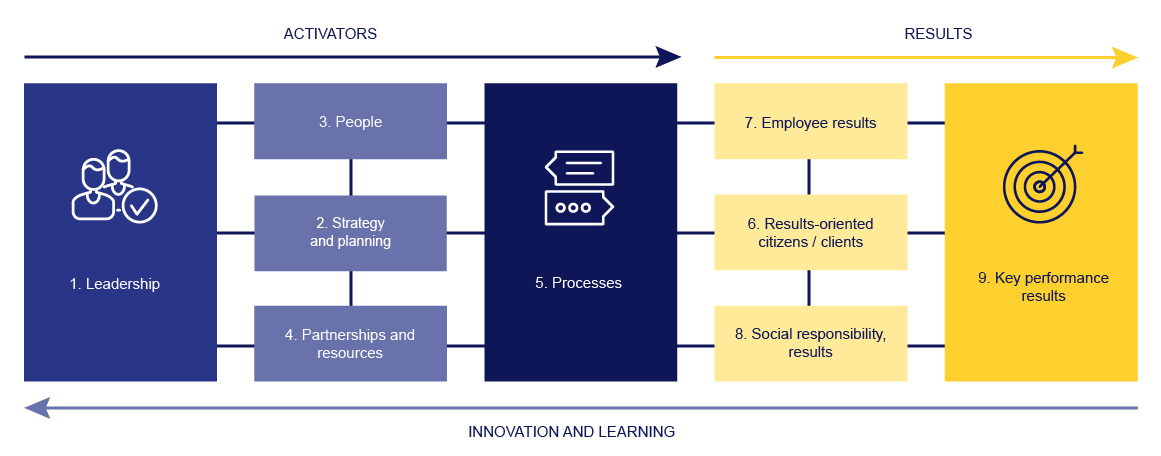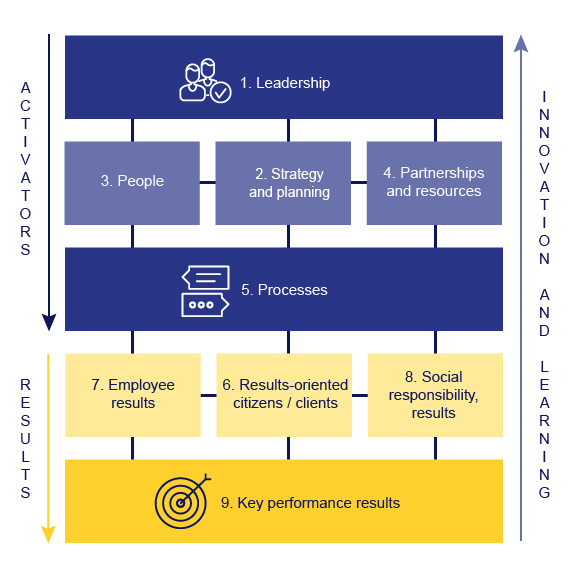European instrument for quality management in public sector
The Common Assessment Framework (CAF) is a result of the cooperation among the EU ministries responsible for Public Administration. A pilot version was presented in May 2000 and revised versions were launched in 2002, 2006 and 2013. A CAF Resource Centre (CAF RC) was created at the European Institute of Public Administration (EIPA) in Maastricht. It works in close cooperation with the network of CAF national correspondents.
The CAF is an easy-to-use, free tool to assist public-sector organisations across Europe in using quality management techniques to improve their performance. The CAF is a Total Quality Management (TQM) tool which is inspired by the major Total Quality models in general, and by the Excellence Model of the European Foundation for Quality Management (EFQM) in particular. It is especially designed for public-sector organisations, taking into account their characteristics.
The model is based on the premise that excellent results in organisational performance, citizens/customers, people and society are achieved through leadership driving strategy and planning, people, partnerships, resources and processes. It looks at the organisation from different angles at the same time; a holistic approach to organisation performance analysis.
The CAF aims to be a catalyst for a full improvement process within the organisations and has five main purposes to:
- introduce public administrations into the culture of excellence and the principles of TQM
- guide them progressively to a full fledged 'Plan-Do-Check-Act (PCDA)' cycle;
- facilitate the self-assessment of a public organisation in order to arrive at a diagnosis and improvement actions;
- act as a bridge across the various models used in quality management;
- facilitate bench learning between public-sector organisations.
Organisations which start implementing CAF have ambition to develop the focus on effects they realise and strive to introduce a culture of excellence. Effective implementation of CAF would eventually lead to further development of such culture and philosophy within the organisation.
The use of CAF in Europe
Since the year 2000, nearly 2000 public sector organisations all over Europe have used the model and the number of CAF Users is still growing.
BiH and CAF
In Bosnia and Herzegovina in the previous years a few public sector organisations started introducing this model. The Revised Action Plan 1 (2011-2014) charged the Public Administration Reform Coordinator’s Office (PARCO) with determination of set of measures for introduction of one of TQM models and its promotion. With the expert support of Deutsche Gesellschaft für Internationale Zusammenarbeit (GIZ) the PARCO developed „Comparative Analysis of Quality Management Models in Public Administration“. This document recommended two models of quality management in BiH, namely CAF and system based on ISO 9001:2008 standard, following which the Council of Ministers of BiH supported further introduction of these models at the level of the institutions of BiH.
The Civil Service Agency is one of the first institutions of BiH (along with the Public Administration Reform Coordinator's Office and the Agency for Statistics of BiH) which introduced this standard, and the first cycle of self-assessment was performed in the period 2016-2018.
Relevant content:



